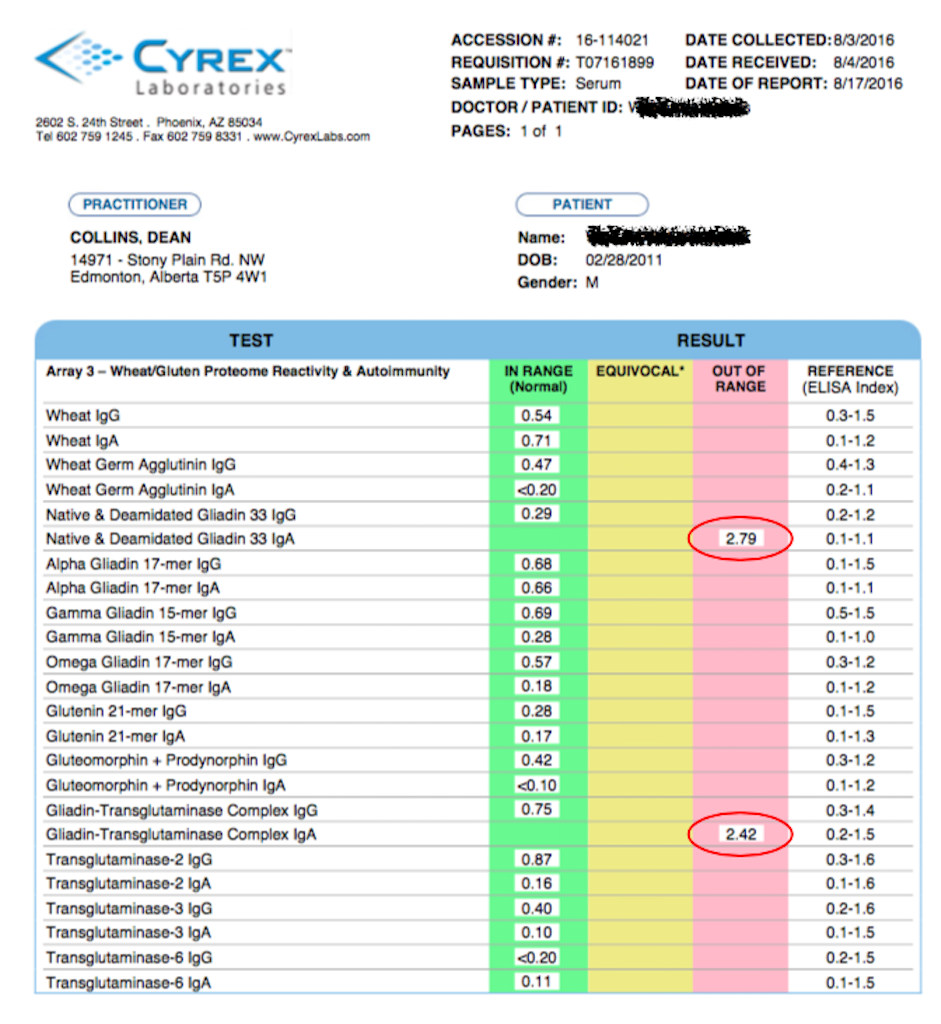
Do you get heart palpitations? Unexplained tremors? Bloating after eating pizza or pasta? Do you have a skin condition that won’t go away? Do you have generalized muscle and joint pain? All of these symptoms can be related to a gluten intolerance and should be taken seriously. Testing yourself to see if you have gluten intolerance is very important to get healthier and stay healthy.
Many of my patients know I take a hard line when it comes to eating gluten. The fact is, I have no problem with someone eating the odd piece of bread or eating that gourmet cake on your birthday if you can tolerate it.
I don’t want to vilify gluten completely. I used to love gooey bread and desserts. So I understand the appeal of treating yourself and the joy it brings. As well, I know two really good people that followed their dreams and opened up a gourmet bakery shop recently. I like supporting family owned small business and I find their story inspiring. The cakes and desserts they make are an art form. I wish I could tolerate gluten, because I would no doubt be one of their regular customers. And I wish them nothing but success in their new venture.
What does gluten intolerance mean and why is it important?
Tolerating gluten means your immune system isn’t reacting (producing antibodies) to one or more of the gluten proteins. Gluten intolerance means your immune system is reacting (producing antibodies) to one or more of the gluten proteins.
Specific symptoms and conditions can arise if your immune system reacts with one or more of the gluten proteins. You don’t have to have the typical digestive symptoms like overt Celiac Disease to know if you react to gluten.(1, 2, 3, 4, 5) Here is a reminder of the symptoms and conditions linked to gluten intolerance:
- Irritable bowel syndrome (gas, bloating, diarrhea, constipation) (6)
- Skin conditions like Keratosis Pilaris (also known as ‘chicken skin’ on the back of your arms) or Dermatitis (7)
- Fatigue, brain fog, or feeling tired (9)
- Depression (10)
- Schizophrenia (11)
- Motor coordination problems (ataxia), dizziness, feeling off balance (12)
- Peripheral neuropathy, myopathy (13)
- Fibromyalgia (14)
- Meniere’s disease (17)
- Insulin resistance and inflammation (18)
- Inflammation, swelling or pain in your joints (19)
- Endometriosis (20)
- Blood sugar problems (21)
- Hypothyroidism (Hashimoto’s) (22, 23)
Be 100% certain you can tolerate gluten before consuming it
“Gluten doesn’t affect me, I’m fine when I eat it.”
“I get a little bloated after eating bread and pizza, but it’s no big deal.”
“My doctor says my joint pain is just because I’m getting older. He didn’t say anything about gluten being a problem.”
“I don’t know doc, gluten doesn’t seem to bother me.”
These are typical remarks I get from patients when I have discussions with them about gluten. Maybe you don’t have any of the above symptoms or conditions listed above, and you think gluten doesn’t affect you. Maybe you’re right. But what if you’re wrong? You could be setting yourself up for a serious health problem.
I have two patients that have developed permanent neurological damage because of gluten. It’s called cerebellar ataxia. One uses a walker and one has an uncontrollable tremor in his leg. What has happened with them, is their immune system has produced antibodies to one of the gluten proteins. The gluten protein looks like the protein in part of the brain that controls movement (the cerebellum). Over time these antibodies started to attack their own brain tissue and now it’s left them in this state.
My job is twofold: to help patients deal with their immediate health problems and to help my patients avoid chronic illness. Finding out if you are gluten intolerant sooner than later can save you a lot of heartache later on in life.
A woman and her 5 year-old son from Nunavet came to see me in the summer of 2016. She wanted to get him tested to see if he had a wheat/gluten intolerance. When he was two years old he had developed a rash on his stomach. His Mom took him off gluten and the rash went away. By the time they saw me the Mom had him off gluten 100%. I asked her why she wanted to spend money on tests if he was gluten free. She said she just needed to know with 100% certainty. So we got him to eat wheat for at least seven days to provocate his immune system and ran some blood tests three weeks later. These are his Cyrex Array 3 test results:
The two numbers I circled in red mean he has a high number of antibodies to a specific gluten protein and an enzyme complex formed by gluten. The enzyme complex is associated with celiac disease. The protein he has antibodies to cross-react with numerous tissues and proteins, including myelin basic protein, synapsin, and myocardial peptide.
Myelin basic protein and synapsin are important for proper nerve function. If you have antibodies to myelin basic protein there is the potential of developing a neurodegenerative illness. So the Mom understood the importance of keeping him off of gluten. This young boy may have developed a chronic nerve problem as an adult if he ate gluten regularly like the average North American. This was a very fulfilling case for me because it was all about preventing a chronic illness.
What was also interesting about this case, is he said his heart felt funny when eating gluten. I expect he had some palpitations and his immune system was affecting the proteins in his heart (myocardial peptide). I used to get heart palpitations as well when I drank beer. Beer, in case you didn’t know, has gluten in it.
My recommendation for you
If you’re not 100% committed to going gluten free, make sure you at least get a Cyrex Array 3 test done. If the test is negative, at least you know that having the odd piece of bread or piece of pizza isn’t going to harm your health. On the flip side, if the test shows you are positive, it will help reinforce the importance of going gluten free.



Two questions;
1. where does one get a Cyrex Array 3 test?
2, more of a comment really .. why can’t beer be the cure?? I love beer 🙁
Hi Elaine,
I order the kit in for the patient. They take the kit into Dynalife to get their blood drawn. Dynalife ships it. I get the results within 2-4 weeks. Then I go over the results with patient.
If it’s somewhere else other than Edmonton we can can drop ship the kit, but we or the patient would have to arrange to get their blood drawn somewhere that would accommodate them and the Cyrex kit instructions. I can go over the results with them via video conference.
Haha. Beer can be the cure for sure. Because I don’t tolerate wheat very well I had to experiment with a variety of gluten free beers out there. I have found a few I like, so I haven’t totally deprived myself of a cool golden goody on a hot weekend afternoon.
What’s the cost of the kit and data analysis?
Cyrex Labs charges $325 US for the Array 3 kit. The cost to interpret the Array 3 is $50 CAN. $200 CAN for the 1/2 hour consult to go over the results with the patient.
I hope it will help a lot for all.Thank you so much for this amazing posts and keep update like this excellent article.
OneDayTop has recently posted for HEALTH : Which are the best teas for health?
Thank you Linda. Sorry I’m not an expert in herbs or herbal teas. I’m an expert in what herbs to use for particular conditions. I do know that green tea is good for you for a variety of reasons.
After pregnancy with my 3rd soon (Forced induction at 34 weeks due to severe preeclampsia) I started to develop bone and muscle pain in my chest and upper back, along with nerve shooting and burning pains, hearing my pulse in my ear, chest feeling pressure, bloatedness, breathlessness episodes and very regular palpitations or shock sensations in my chest. After a year of getting nowhere and having it blamed on anxiety, I had an endoscopy which confirmed gastritis (lesions on my lower stomach). I have been on a 9 week course of 40mg proton pump inhibitors, and told if symptoms persist after, then to be referred back to the gastro unit. Although most of my symptoms were gone, and the frequency of palpitations lessened, i was still getting funny feelings in my chest, and still constipated (have been since birth of son). My GP didn’t refer me back to gastro unit & instead has referred me to arrhythmia (i have already had a chest xray, and 3 heart traces which showed a normal rhythm) because he said i shouldn’t still be getting them whilst on the PPIs. i am now on 20mg proton pump inhibitors whilst I wait for my appointment and my palpitations are getting worse again. But they were better on the higher dose of PPIs so surely it must be gastro related like the gastro unit advised. I know Cider gives me chest pains since all this started, bacon cobs, pizza and I’m just wondering if this could be a gluten issue?
Hi Coral,
There is the potential that it could be a gluten issue. The only way to know is to eliminate it 100% (no cheating) for 30-60 days and see if some or all of your symptoms get better.
Dr. Collins
Hi Dr. Collins,
I have recently experience heart palpitations .I stopped eating Gluten and the palps have subsided.
Ran into an article saying that if you stop eating Gluten and you DON’T have Celiac Disease you could damage your heart. What’s your take on this ?
https://www.cbsnews.com/news/gluten-free-diet-without-a-medical-reason-heart-health/
Sorry for the late reply Scott. Hmmm…interesting. I can’t see why improving your diet by avoiding refined flours and eating whole foods would damage your heart. Doesn’t make sense to me.
Dr. Collins
Hi Dr. Collins,
I am a 21 year old female who had sudden on set heart palpitations along with brain fog, weight loss, dizziness and bowel problems for 3 months. I saw many doctors including a cardiologist and all my results came back normal. They all blamed anxiety but I just didn’t think it was right. I noticed my palpitations were worse after eating foods high in gluten for example pasta. I recently decided to stop eating gluten all together and I have seen immoderate improvement. I no longer have heart palpitations or brain fog and my bowel movements are slowly improving. Would you recommend me continuing this diet? And is there a chance I could be celiac? I want to get tested but I know this would require me eating gluten foods again and I don’t want to feel that unwell again.
Hi Valentina,
Thanks for your inquiries. Those are pretty great improvements. By the sounds of it, yes, I would recommend you lay off gluten 100%. And yes, certainly there is a chance you could have celiac disease. You have two options if you need more confirmation that eating gluten is creating your symptoms: One, you can go back to your old ways and start eating gluten again and monitor your symptoms, and see if they come back or get worse. Or two, you can pay for lab testing through Cyrex labs. Read the following articles I wrote to help you decide:
https://drcollins.ca/food-intolerance-testing-accurate/
https://drcollins.ca/importance-identifying-food-intolerances/
On a personal basis, I went through a cheat and elimination process with wheat 4 times before I said enough is enough. My symptoms just kept getting worse and getting tested for celiac disease was a moot point because I committed to avoiding gluten completely forever.
Hope this helps.
Dr. Collins